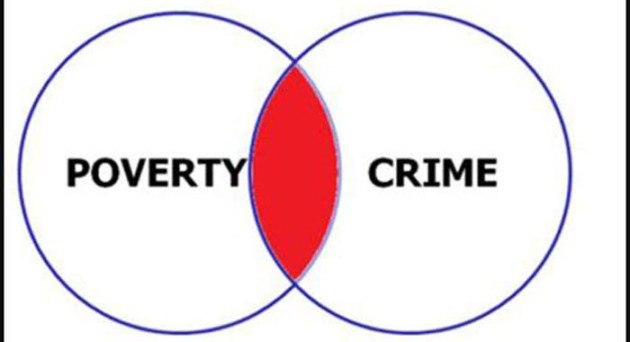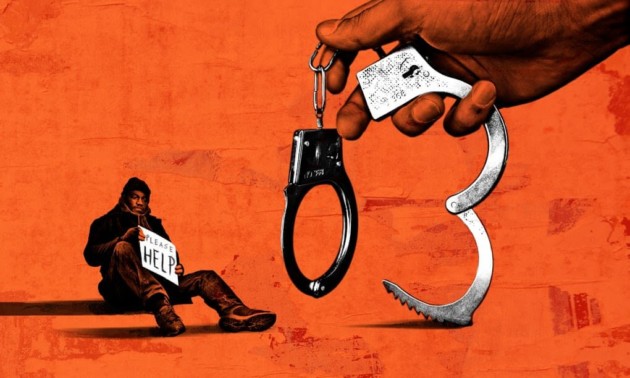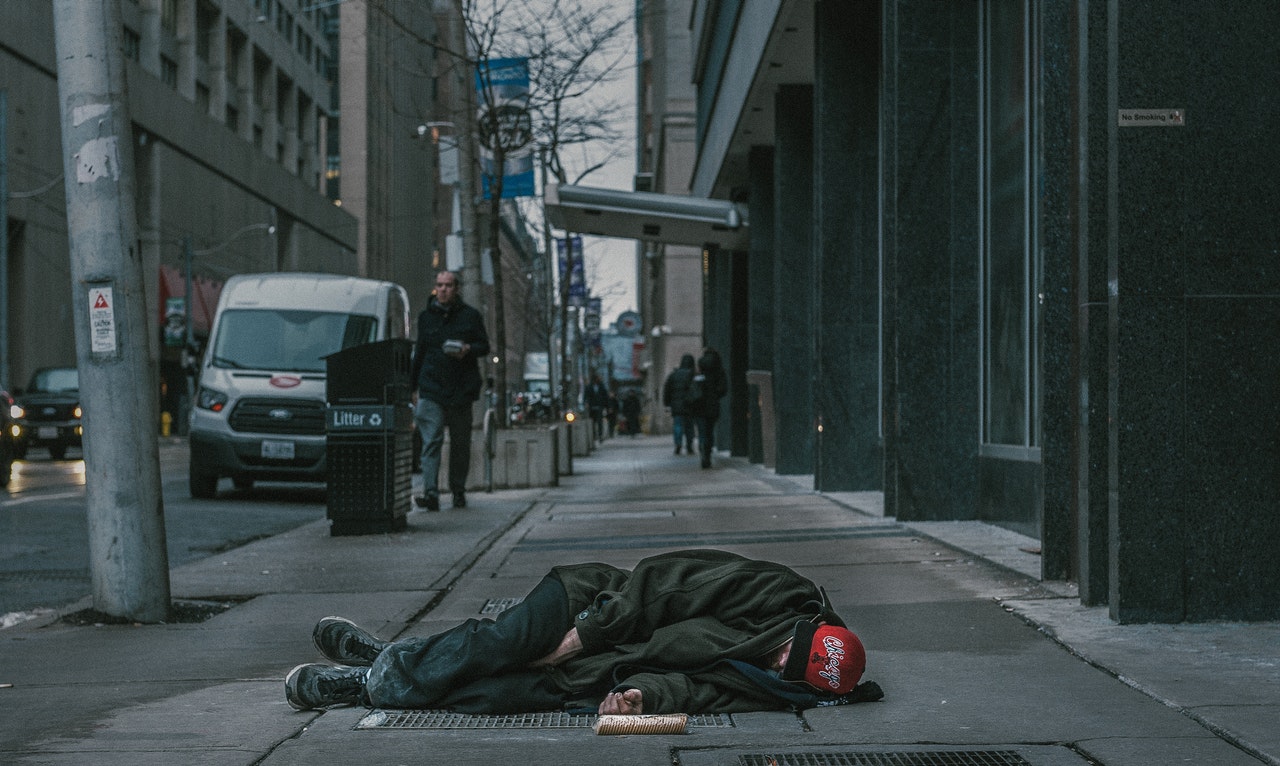“Poverty is not the root cause of crime”~ Rush Limbaugh
One of the misconceptions in the world is whenever a theory regarding some phenomenon is propounded,it is always looked upon in the manner that it should fit in all the scenarios, which gives rise to criticisms to almost every theory. Similarly in the case of criminal theories as well, the situation is not different.
However it is not necessary and particularly for social theories,not practically possible to become applicable in all circumstances.Different theories regarding a single idea or phenomenon can work or be applied simultaneously in different aspects or areas of a single phenomenon.

Moreover there is no harm in colluding different theories for a single idea.
Whenever the word “crime” is broadly defined with reasons and consequences,the first cause it is related to, is poverty.A huge number of articles and works can be easily found which hold poverty as the main criteria behind crimes.Nevertheless it is not always true.Poor do not always end up to be criminals and likewise rich do not every time turn out to be law abiding citizens.
Poverty is pronounced deprivation in well-being, and comprises many dimensions. It includes low incomes and the inability to acquire the basic goods and services necessary for survival with dignity. Poverty also encompasses low levels of health and education, poor access to clean water and sanitation, inadequate physical security, lack of voice, and insufficient capacity and opportunity to better one’s life.(World Bank)
In ordinary language, a crime is an unlawful act punishable by a state or other authority.
One proposed definition is that a crime or offence (or criminal offence) is an act harmful not only to some individual but also to a community, society, or the state (“a public wrong”). Such acts are forbidden and punishable by law.(Oxford Dictionary of Law)
Crime can also be understood as any action negated by the whole community as being wrong,harmful which drives the public sentiment against it.
There are different types of crimes that exist in world today.Theft,homicide,sexual offences,frauds,offences against property,white collar crimes etc.
The practical trend between crime and poverty
On one hand the crime rate is increasing with time.Venezuela has the highest crime rate in world today,followed by Papua New Guinea and next by South Africa.
On the other hand the world is working towards increasing the economic growth.Most of the economists believe that economic growth benefits,even if not equally, nearly all citizens of a country,and therefore reduces poverty.
Therefore as per the visible trend crime rate and poverty are not proportional to each other.
In addition,today,estimates for global poverty are approximately 8.6% of the world,which accounts for about 736 million people of the world.
In contrast to this 10.35 million people are in prison around the world,report published by the Institute for Criminal Policy Research shows.
Now the difference between two figures is huge,clearly implying poverty is not a major contributor of crimes in world.
Also,no doubt many times crimes are committed because of poverty e.g theft and at times homicide as well.
However it is not necessary that poor always commit these money driving offences and it is not just an assumption.

There are few anecdotes worth mention.
There are few acquaintances who were poor but instead of turning to crimes,worked hard to make their lives better.
There was a person in the neighboorhood belonging to a poor family and unable to afford a normal life.Instead of following the normal presumption that the person would have for example turned into a thief,the mentioned person rather used to borrow the books from his friends for night hours so that the person would not have to give up his education because of poverty As of today the person is a lecturer in a reputed school.
Another anecdote is about a boy belonging to an extremely poor family and again the boy is a doctor today.
As against this,a number of teens belonging to well reputed families become drug addicts and in turn steal in their own homes to fulfill their needs.
Sexual offences
- It is estimated that 35 per cent of women worldwide have experienced either physical and/or sexual intimate partner violence or sexual violence by a non-partner (not including sexual harassment) at some point in their lives. However, some national studies show that up to 70 per cent of women have experienced physical and/or sexual violence from an intimate partner in their lifetime.
- Twenty-three per cent of female undergraduate university students have reported having experienced sexual assault or sexual misconduct in a survey across 27 universities in the United States in 2015.
- One in 10 women in the European Union report having experienced cyber-harassment since the age of 15 (including having received unwanted, offensive sexually explicit emails or SMS messages, or offensive, inappropriate advances on social networking sites). The risk is highest among young women between 18 and 29 years of age.
- In a multi-country study from the Middle East and North Africa, between 40 and 60 per cent of women said they had ever experienced street-based sexual harassment (mainly sexual comments, stalking/following, or staring/ogling), and 31 per cent to 64 per cent of men said they had ever carried out such acts.Younger men,men with more education,and men who experienced violence as children were more likely to engage in street sexual harassment.
- South Africa has the highest rate of rape in the world of 132.4 incidents per 100,000 people. According to a survey conducted by the South African Medical Research Council, approximately one in four men surveyed admitted to committing rape.
- The United States has a rape rate of 27.3. As in many other countries,rape is grossly underreported in the United States due to victim shaming, fear of reprisal,fear of family knowing etc.
- In India, a rape is reported every 15 minutes, according to recently released official government data by National Crime Records Bureau (NCRB).
It is not rational to hold poverty responsible for sexual offences
Firstly,sexual offences are also committed by economically stable as well as by people belonging to elite class.For instance,sexual assault allegations that arose in the wake of the #MeToo movement suggest that many wealthier and higher status men have committed sexual assault with near impunity for many years.
Secondly,there is no relation between being poor and being a sexual offender.For example sexually offending someone cannot derive money for any poor.
Now the greater arguments to put forth.
There is some difference that makes two people belonging to same poor background to steal or to work hard respectively.
There is some similarity that makes two people belonging to a poor and a elite family respectively,both to commit some sexual offence against women.
This difference or this similarity in people whether belonging to poor or rich family to act similarly in different situations or differently in similar situations is Moral Values.The likelihood that someone will commit a crime has nothing to do with what school they went to or how much money is in their or their parents’ bank account.It is about having a functioning self conscience and moral self control.
Moral values are the basic principle that influence human’s behaviors.The presence of basic life principles,makes a person insusceptible to the environment.These moral principles guide a person to behave and are a positive potential in human being. Values are the rules by which a person can make decisions about right and wrong, should and should not, good and bad.
- A person with moral values will resist from doing any wrong or crime.
- The morals of a penniless person,in grave need of money will not allow him to steal.
- An instigated and agitated person will not harm or kill other person only if the proper moral guidance has been provided.
- A morally educated person will not offend women as the moral values inspire to respect women and not to treat women like any subordinate being.
In conclusion,it is a better approach to study the relationship between crime and moral values and good character.Accordingly it is important that moral building is given vital importance prior to career building or anything else.Furthermore it is necessary to make moral values part of the curriculum in schools,colleges and primarily at homes because after all,home is the first school and parents are first teachers to children.


